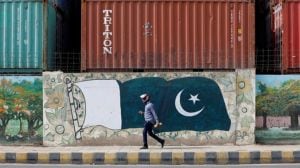As the peace initiative in Kashmir evolves into a serious effort, many have started feeling insecure. Some vested interests use bullets to stall the process, others are using the politics of the ballot to derail it. The jehadi groups oppose any peace process because it does not fit into their scheme of things. Their aim has never been to resolve the Kashmir problem according to the wishes of its people. They look at Kashmir as one small battle in the pan-Islamic movement. But from the way chief minister Farooq Abdullah has stuck to his schedule for the panchayat polls, at a time when there is an urgent need to avoid provoking a violent reaction from the militants, it appears the peace initiative does not fit into his scheme of things either.
Why is Abdullah insisting on polls when the government has declared a unilateral ceasefire? Why the hurry to hold them now? Why is this particular moment alone suitable, when the state has already waited for them for more than two and a half decades? Why couldn8217;t the panchayat polls be postponed to strengthen the peace process and make the ceasefire more credible? After a decade of mayhem, what is the priority for Kashmir and Kashmiris: launching a process to resolve the problem that can lead to permanent peace, or transferring power to the people at the grassroots?

The Centre has asked the security forces to halt all operations against militants and only open fire in defence. But Abdullah wants them to come out and prevent militants from obstructing the electoral process. How can security forces, whose hands are tied by a ceasefire, prevent strikes by militants who view any polls as a provocation? Even the army, BSF and local police have admitted the difficulty of the task. It appears to be both contradictory and unreasonable. It is contradictory, in fact, but not without a reason. The reason is the political survival of Farooq Abdullah and his party.
Abdullah8217;s worries are well founded. He knows that he will be the first victim of any serious initiative to start a peace process in Kashmir that involves both Pakistan and the separatist conglomerate, the Hurriyat Conference. He knows his survival lies in preserving the status quo. There is hardly any difference, in fact, in the approach taken by the hardliners among the separatists and him. Both want the process to be nipped in the bud because it goes against their interests.
For separatist hawks, violence has become an industry. If the Kashmir front quietens, where will they send their warriors? For them, it is also a matter of ideology. They don8217;t believe in conflict resolution through dialogue but through jehad. For Abdullah, the continuation of violence means political uncertainty and his survival feeds on this confusion. He is in the seat of power merely because he is a necessary evil for the government of India in Kashmir. No one else seems to be ready to occupy the chair on Delhi8217;s terms and conditions while Abdullah divorced his party8217;s decades old ideology to join the BJP coalition, stating he would align with any party that comes to power at the Centre. Kashmir got nothing in return, neither financial relief nor a serious hearing of the National Conference8217;s autonomy demand. Abdullah8217;s real reasons for joining the BJP-led coalition were personal. His son got a ministerial berth.
Now that the peace effort in Kashmir is finally gaining ground, and a slim chance has been born to end the violence and initiate a purposeful dialogue involving every party to this 50-year old dispute, Farooq Abdullah should not be allowed to play his politics. The need of the hour is to be patient and supportive, not to muddy the waters by a self-interested exercise that could undermine the entire process. Never in the past has any prime minister taken such a bold step in Kashmir. Nor has the Pakistani establishment ever reciprocated to the initiative in such a manner. The Hurriyat Conference is on its way to Pakistan and its leaders know it is not a pleasure trip. They have an agenda. They will talk to the militant leadership and also to the Pakistani establishment and try to explore ways to carry this process forward. It will be the first time that the entire separatist leadership of Kashmir, including the militants, will sit together and deliberate.
If the Hurriyat comes up as a political forum representing the entire separatist movement, it will surely be an achievement. At least then one will know whom to talk to. The Hurriyat leadership will also discuss the agenda for any future dialogue with the Centre at any level with both the militant leadership and the Pakistani establishment. What will Kashmir achieve through panchayat polls at this juncture, when the elections for the assembly and even Parliament have not changed anything on the ground? If the percentage of voter turnout or a show of democracy could work wonders, then guns would have been silenced in Kashmir in the four years since the 1996 assembly elections.
Story continues below this ad
This gambit has been tested in Kashmir before, and it has failed miserable. People were coerced to vote in almost all elections. Nail parades8217; were conducted by the security forces to check whether or not the people8217;s fingers were stained with polling booth ink. The security forces had taken the elections as an assignment 8212; the voter turnout was supposed to determine how successful they were. At the end of each election, the people got a representative. But the only difference it made to their daily lives was that it added to the state8217;s VIP list and created one more layer of rulers.
Now, by going ahead with his ambitious project of panchayat polls, Farooq Abdullah is virtually creating a 8220;hit-list8221; for those militant groups that are desperately looking for an opportunity to stall the peace process. There are around 27,000 panch constituencies in the state which include 3000 sarpanch berths. If a minimum of two people contest from each constituency, more than 50,000 persons will be directly involved in the process. The police have denied outright personal security to the contesting candidates. Amid the cease-fire, the forces cannot carry out crackdown operations, raids or even road-side checking and frisking. The government will only be able to provide security at polling booths and the area during the voting itself, which means a few dozen soldiers and policemen will camp there for a few days. Once the process is over, they will leave behind the newly elected panches, as well as those who are defeated, as sitting ducks for the militants. If a few dozen political killings occur, andthe peace process is thrown off track, both the separatist hawks and the chief minister will benefit, while the people of Kashmir will be left in mourning once again.
































